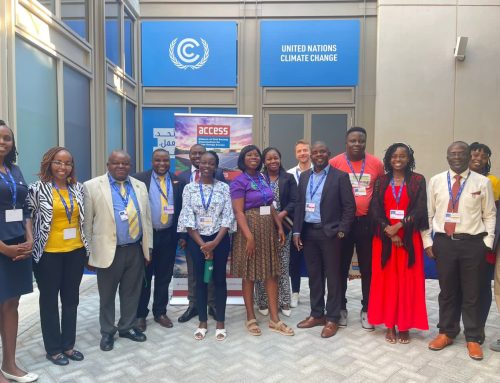On 18 November 2020, Kenya’s Ministry of Energy launched the Bioenergy Strategy (2020-2027) whose overarching objective is sustainable production and consumption of bioenergy for all bioenergy users. The Strategy places Kenya firmly on track towards achieving 100% access to modern bioenergy services by 2030, including a commitment to meet clean cooking targets by 2028. Among others, the strategy aims to:
- Promote the sustainable production and consumption of bioenergy with attendant human health, economic and environmental benefits;
- Provide potential investors with requisite information on viable opportunities for bioenergy development in Kenya;
- Accelerate transition to clean cooking technologies and fuels; and
- Serve as a framework for regional cooperation and trade in bioenergy and related feedstock as called for by the Africa Bioenergy Policy Framework and Guidelines (African Union & UNECA)
The strategy was developed with support from the World Bank who commended the government’s commitment to attaining energy access goals given that the Ministry earlier in the year also launched the National Energy Efficiency and Conservation Strategy, and in 2019 launched the Gender Energy Policy. GiZ and ICRAF also supported the process, with the former indicating that they would be supporting implementation of the strategy by meeting the targets set for clean cooking.
The Bioenergy Strategy sets forth guidelines, approaches and strategic interventions to promote development and sustainable utilization of bioenergy resources in Kenya over the 2020-2027 period. To achieve the set objectives, the Strategy identifies three crucial features which are: (a) a delivery and coordination mechanism to oversee implementation of the strategy, including clear private sector involvement; (b) recognition of adaptive planning and multi-stakeholder consultations around innovation platforms and; (c) strong role of learning and feedback.
Why now?
The country is highly dependent on biomass energy which provides 68% of the total energy supply (MoE &CCAK, 2019). The development of the Strategy is a step in the right direction as we enter the final decade of achieving sustainable development goals (SDGs) that include access to affordable, reliable, sustainable and modern energy for all by 2030 (SDG 7).
Secondly, the Strategy is being launched at a time when the world is grappling with the Covid-19 pandemic and is turning its attention to health concerns attributed to cooking both at household and institutional levels. It rightfully recognizes that Household Air Pollution (HAP) from continued use of charcoal, firewood and other unprocessed solid biomass fuels (e.g. crop residues) burnt in inefficient cook stoves and poorly ventilated kitchens has been associated with respiratory diseases. According to Kenya’s Ministry of Health, these diseases make up 25% of the total disease burden in Kenya. HAP also increases vulnerability of households to Covid-19. Advancing access to clean cooking technologies and fuels is an important precursor of preventive health services.
Next steps
In efforts to ‘walk the talk’, the Strategy identifies key next steps to ensure institutionalization within the Ministry’s Renewable Energy Directorate and coordination at sub-national level. Key immediate and long-term actions identified are:
- Harmonizing institutional mandates – with the aim of resolving conflicting mandates among state agencies in order to enable effective delivery and coordination of programmes
- Mapping of country’s biomass resources – to develop a comprehensive inventory with estimates of potential for bioenergy development
- Research and development – to better inform bioenergy policy and support sector development by assessing existing gaps and opportunities
- Research and development – to better inform bioenergy policy and support sector development by assessing existing gaps and opportunities
- Facilitate existing energy multi-stakeholder associations to champion the planning and coordination of bioenergy innovation platforms around specific bioenergy types
- Bioethanol blending – with gasoline for transport sector consumption.
ACCESS regional node for East Africa – Kenya Climate change Working Group (KCCWG) – will work closely with the government and other stakeholders in Kenya to support implementation of the Strategy. To this end, ACCESS Coalition and KCCWG will ensure the voices of CSOs are heard through championing the need for clear and consultative stakeholder involvement to harness the views, experiences and expertise of both energy-poor communities and experts to support implementation of the strategy.
Contact: communications@access-coalition.org





[…] Alliance for Civil Society Organizations for Clean Energy Access: Kenya launches its bioenergy strategy […]